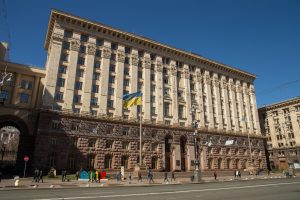
Polish authorities have agreed with farmers on subsidies per ton of grain and temporary closure of the border with Ukraine from April 1 for the transit of some agricultural products, polskieradio24.pl reported.
According to the newspaper, the document was signed by representatives of the protesting farmers, Agriculture Minister Czeslaw Seckerski and the ministry’s state secretary Michal Kolodziejczak.
The agreement envisages maintaining the current embargo on agricultural products from Ukraine, which has been in place since mid-September last year. It concerns in particular wheat, corn, wheat flour, rapeseed and sunflower.
In addition, the Minister of Agriculture must ask the Council of Ministers of the European Union to suspend the transit of these products through Polish territory as of April 1 this year.
Both sides in the signed document also consider it necessary to develop detailed rules for agri-food trade between Poland and Ukraine, but also note that the difficult situation in agriculture is the result of Russia’s aggression against Ukraine.
Farmers’ representatives in the agreement declare their government’s support for the changes to the Green Agreement. It is primarily about replacing the mandatory transfer to a voluntary ecosystem and simplifying other rules for farmers.
AUTHORITIES, BORDER, FARMERS, GRAIN, POLAND, transit products, UKRAINE

Kyiv authorities have decided to toughen the measures aimed at the prevention of the spread of coronavirus (COVID-19) in the capital in line with the government’s instruction, Kyiv Mayor Vitali Klitschko said.
“I would like to inform you that, in line with the government’s instruction, the city has approved a decision to toughen the anti-epidemic measures in the capital. In particular, the working hours of restaurants and entertainment facilities (including cinemas) are restricted until 22:00. Mass cultural, entertainment, sports, promotional events also can be held until 22:00,” the mayor said during an online press conference on Wednesday.
As reported, Kyiv registered 101 new COVID-19 cases, including 7 medical workers, in the past 24 hours.

The Ministry of Digital Transformation of Ukraine together with the relevant committee of the Verkhovna Rada are working on the preparation of a tax reform for the IT industry, which provides for the establishment of a single tax at the level of 4-7% of the companies’ turnover. Deputy Minister of Digital Transformation Oleksandr Bornyakov gave this information on his Facebook page.
“We propose discussing a single tax for legal entities without a turnover limit and setting it at 4-7%… According to this regime, a legal entity-exporter of services will pay a single tax and will be a tax agent for an employee, paying two single social security contributions and a military tax,” Bornyakov said.
He also said that the following requirements for those who join this taxation regime are being discussed: staff of more than 10 employees; the share of exports in profit and the share of the salary fund in the cost of production being more than 75%; and the average salary being at least five minimum wages.
According to the Ministry of Digital Transformation, this will create legal working environment for the industry, make it more attractive for investment, creating a transparent and understandable corporate structure. In addition, this will create equal competitive working conditions in the industry, as well as conditions for the export of other services.
“At the same time, the model preserves the mechanism for ensuring social guarantees for employees and does not increase the tax burden and administration. After all, on the one hand, tax and reporting are introduced for IT companies, and on the other, we cancel a number of taxes for employees,” the deputy minister said.
He also cited statistics according to which in the first half of 2019, according to the Ministry of Digital Transformation, 158,000 IT private entrepreneurs with income of UAH 52.3 billion worked in Ukraine. At the same time, in Ukraine, there are only about 60,000 officially employed employees of IT companies, whose payroll amounted to about UAH 6.5 billion in the first half of last year.
“And no, we are not sure that this is the only right decision. But, after spending hours of analysis, we consider it to be the best idea that will literally create an industry where not 200,000 legally unrelated private entrepreneurs will work, but fully-featured transparent companies,” Bornyakov said.
He also recalled that the previously formulated idea to create a fifth group of private entrepreneurs for IT specialists was criticized because it violated the principles of equality of taxpayers and did not eliminate any risks in the system.
As reported, previously a group of 20 deputies of the Servant of the People parliamentary faction proposed to the parliament to exempt startups from taxes for a period of nine months from the moment of their registration, making appropriate changes to the Tax Code of Ukraine.
For this purpose, it was planned to introduce an additional fifth single tax group, which will include startups using exclusively cash registers and/or cash settlement software and which income during the first nine months of activity does not exceed UAH 300,000.

The European Investment Bank (EIB) has approved a EUR 50 million credit line to help Ukraine’s railway and road authorities, Ukrzaliznytsia and Ukravtodor, eliminate bottlenecks in European transport networks. As the bank announced, its board of directors approved the project on September 19, 2018. It covers projects for small transport infrastructure worth up to EUR 20 million.
Loans are to be used to improve interaction within the framework of the Eastern Neighborhood and provide substantial support for small-scale but locally significant projects. It is also expected that such financing will improve traffic safety.
The EIB document states that the total cost of this framework project is approximately EUR 110 million, but other sources of co-financing are not specified.

Kyiv authorities formally renamed international airport Zhuliany “Igor Sikorsky Kyiv International Airport”. The airport is widely known as ‘Zhuliany’ after the surrounding neighborhood of the same name. Igor Sikorsky was born in Kyiv. During World War I, he designed and constructed bombers for Russia’s military. After the communists came to power and threatened him and his family, Sikorsky emigrated to the USA. There, he gained renown for designing and manufacturing fixed wing aircraft and helicopters.
The Kyiv international airport (Zhuliany) serviced 130,800 passengers in February 2018, which is 51.6% more than in February 2017, the airport’s press service has reported.
The press service said that the number of passengers on international flights was 124,900 and on domestic flights – 5,900.
The number of flights in February 2018 was 1,648, which is 20.5% more than a year ago, including 1,356 international flights and 292 domestic flights.
The most popular international destinations in February-2018 remained similar to January: Dubai (the UAE), Minsk (Belarus), Ankara (Turkey), Budapest (Hungary), Warsaw (Poland), Memmingen (Germany), Rome (Italy); and domestic – Odesa, Zaporizhia and Lviv.
AUTHORITIES, IGOR SIKORSKY, INTERNATIONAL AIRPORT, KYIV, ZHULIANY